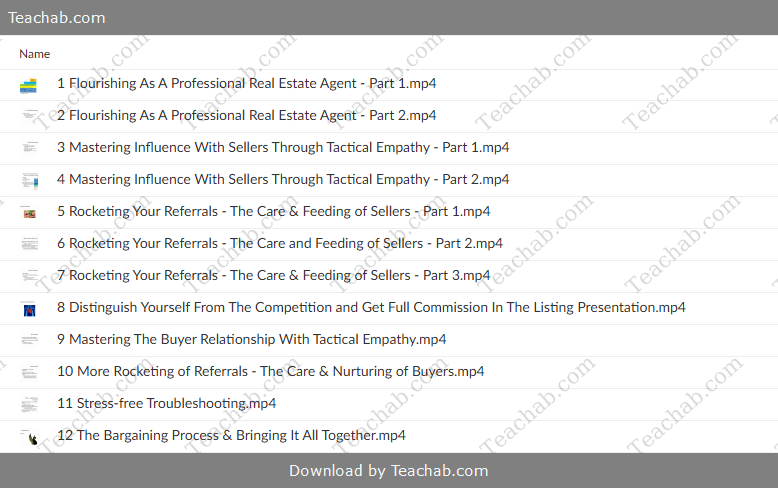Never Split The Difference For Real Estate Professionals by Chris Voss
$199.00 Original price was: $199.00.$15.40Current price is: $15.40.
Never Split the Difference: Negotiating as if Your Life Depended on It for Real Estate Professionals – Immediate Download!
Let See The Content Inside This Course:

Description:
Effective negotiation is frequently the difference between a successful transaction and a lost chance in the cutthroat world of real estate. In his book Never Split the Difference: Negotiating As If Your Life Depended on It, former FBI hostage negotiator Chris Voss provides a perceptive strategy. In addition to its captivating stories and anecdotes, this book is notable for its psychological insights and useful tactics that can greatly help real estate agents. Voss gives readers ways to improve their negotiation skills beyond conventional approaches by emphasizing emotional intelligence and advanced negotiation strategies.
The fundamental ideas in the book enable real estate brokers and other industry experts to handle discussions with assurance and skill. Readers can discover how to build trust, comprehend emotional dynamics, and get the best results in a variety of real estate-related settings by exploring Voss’s tactics.

The Essence of Tactical Empathy
Tactical empathy is one of the more interesting ideas Voss presents. This principle highlights how important it is to comprehend and accept the feelings and viewpoints of the other person. This strategy can have a big impact on results in real estate transactions, where rapport and relationships are crucial. Professionals can establish stronger bonds with customers, vendors, and other stakeholders by using tactical empathy, which promotes teamwork.
Voss provides examples of how developing a relationship through tactical empathy results in more fruitful negotiations. For example, a buyer may be more likely to trust the agent’s advice if they feel understood, which may lead to prospects for better terms or concessions. By using this approach, real estate agents can develop connections that go beyond simple business dealings, which improves long-term collaborations and encourages repeat business.
Active listening is a technique that real estate brokers can use to successfully use tactical empathy. This entails not just listening to what the other person says, but also deciphering the emotions and intentions that underlie their statements. Agents can improve negotiations by fostering a comfortable environment for candid communication by confirming such emotions, whether orally or by body language.
Calibrated Questions: Navigating Complex Conversations
Another strategic tool that Voss emphasizes are calibrated questions. These inquiries are specifically designed to encourage dialogue and prompt deeper reflection from the other party. In negotiating real estate deals, calibrated questions can be instrumental in steering conversations toward mutually beneficial outcomes.
For example, instead of asking, “Can you lower your price?” a calibrated question would be, “How can we work together to reach a price that reflects the value of the property and meets both our needs?” Such questions compel the other party not only to evaluate their position but also to actively engage in the problem-solving process. This fosters a sense of collaboration, making it easier to reach an agreement that satisfies both parties.
To further understand the effectiveness of calibrated questions, consider their application in different negotiation contexts, such as buyer-seller negotiations or lease agreements. By using well-crafted inquiries, real estate professionals can unveil hidden concerns and priorities, thus getting a clearer picture of the other party’s motivations and potential compromises.
Embracing “No” as a Starting Point
Additionally, Voss questions the widely held belief that the ultimate objective in negotiations is “yes.” He provides examples of how getting the other person to say “no” might really be a smart place to start when having more productive conversations. The approach is based on the notion that saying “no” can set limits and give you leverage, which will ultimately result in a more open communication environment.
This is especially important for real estate agents when negotiating conditions of contracts or rates. By initially declining an offered deal, a client may feel more empowered and open to additional discussion and term modification. The opposing party feels more in control of the situation when agents give them an opportunity to voice their concerns by inviting a “no.” In addition to building confidence, this may result in better solutions that serve the interests of both sides.
Practically speaking, agents might use this tactic by presenting offers in a way that permits rejection while promoting conversation. For example, asking, “Would you be open to discussing a price that reflects recent market trends?” allows the other person to maintain the conversation while establishing their limitations. This strategy supports the notion that negotiations are a collaborative and communicative process rather than just a transactional one.
The Power of Preparation and Research
Voss emphasizes the need of planning ahead and conducting research before engaging in negotiations. Gaining insight into the needs, desires, and underlying motives of the other side can have a big impact on negotiations. This diligence frequently results in the discovery of what Voss calls “black swans,” or unanticipated facts that have the potential to significantly change the dynamics of the negotiation.
For example, a real estate agent’s attitude and technique may be influenced if they are aware that a seller is experiencing financial strain or personal situations that require a speedy sale. Agents can come up with innovative solutions that better suit the seller’s actual demands by basing bids or discussions on these insights.
Researching comparable property sales, comprehending local market trends, and even speaking with people who know the seller are all possible steps in the process of complete preparation. Agents can position themselves favorably in negotiations and open the door to positive results by developing a thorough profile of the other party and their circumstances.
To summarize, effective preparation can be distilled into key actions:
- Conduct research on current market conditions.
- Gather data on comparable sales and rental values.
- Understand the emotional and financial circumstances influencing the other party.
- Use insights to craft tailored negotiation strategies.
These steps enable real estate professionals to become adept negotiators who can navigate complex scenarios and emerge victorious.
Real-Life Applications and Case Studies
Voss uses a wealth of real-world examples from his negotiation experience to enhance his lessons. In addition to demonstrating the efficacy of his strategies, these case studies help real estate professionals relate to and apply the theoretical parts of negotiation.
He describes a high-stakes negotiation involving the release of hostages, for example, in which success depended on an awareness of human emotions. These anecdotes highlight the human side of negotiation, demonstrating that it is based on empathy and connection rather than just strategic maneuvers.
Agents can improve their negotiations in the real estate market by using these tips. Imagine an agent dealing with a seller who is obstinate and insistent on a much higher asking price. Using Voss’s strategies, the agent can ask thoughtful questions to entice the seller to consider more affordable pricing possibilities while also demonstrating tactical empathy to convey understanding of the seller’s emotional attachment to the property. Through this procedure, a more fruitful dialogue is fostered in an atmosphere of mutual understanding.
The idea of employing tales in client interactions is also advantageous for real estate agents. In addition to establishing rapport, brokers assist customers in connecting their circumstances to more general market narratives by sharing anecdotes of prior successes or typical difficulties encountered in comparable transactions.
Conclusion
In the fast-paced and competitive world of real estate, the principles outlined in Chris Voss’s Never Split the Difference provide invaluable resources. Through tactical empathy, calibrated questions, embracing “no,” thorough preparation, and engaging storytelling, real estate professionals can refine their negotiation skills significantly. The insights gleaned from Voss’s experience can empower agents to navigate negotiations with greater confidence and achieve best-case outcomes for their clients. By integrating these techniques into their practice, real estate professionals set themselves apart in a crowded marketplace, creating not only successful transactions but also lasting relationships built on trust and understanding. As the industry continues to evolve, adopting such innovative strategies will undoubtedly lead to enhanced negotiation capabilities and, ultimately, greater success.
Frequently Requested Enquiries:
Innovation in Business Models: We employ a group buying strategy that allows customers to divide costs and receive a lower rate for popular courses. Despite content providers’ concerns about distribution tactics, this approach benefits low-income individuals.
Legal Aspects: The legality of our conduct raises a number of complex issues. Although we do not have the course developer’s official permission to redistribute their content, there are no clear resale restrictions stated at the time of purchase. We have the opportunity to provide affordable educational resources because of this uncertainty.
Quality Control: We ensure that all of the course materials we purchase are identical to those supplied by the writers. However, it is important to understand that we are not approved vendors. Consequently, our products don’t include:
– In-person consultations or phone conversations with the course developer for advice.
– Access to sites or organizations that are exclusive to authors.
– Engaging in private forums.
– Simple email support from the author or their team.
By offering these courses independently, without the premium services of the official channels, we hope to reduce the barrier to education. We appreciate your understanding of our unique approach.
Be the first to review “Never Split The Difference For Real Estate Professionals by Chris Voss” Cancel reply
You must be logged in to post a review.

















Reviews
There are no reviews yet.